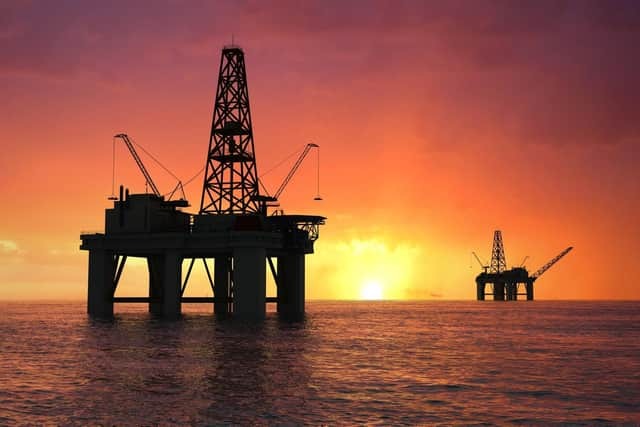North Sea: New oil and gas drilling licences every year under government plans
New licences for oil and gas drilling are to be issued every year under plans due to be set out in the King’s Speech tomorrow.
UK government ministers say the plan will bolster energy security and reduce dependence on imports.
Advertisement
Hide AdAdvertisement
Hide AdThere is currently no fixed period between licensing rounds, but a bill to be announced tomorrow will change this with projects also having to meet net zero targets.


Oil and gas companies have welcomed the plans as creating “new opportunities” for the industry.
The UK Government believes the move will provide job security for 200,000 workers in the £16 billion industry more secure, and to help with the transition to net zero in 2050.
The legislation will require the North Sea Transition Authority (NSTA) to invite applications for new production license on an annual basis to “safeguard the prosperity of our country”.
Data published by the Climate Change Committee showed the UK will continue to rely on oil and gas to help meet its energy needs even after net zero in 2050.
Production from new gas and oil fields in the North Sea can be much cleaner than older ones, and it is tipped to help unlock green investment and development of technologies including hydrogen.
Renewables generated a record 48.1 per cent of electricity in the first quarter of this year.
The UK Government said the move would “bolster energy security, reducing reliance on imports from hostile foreign regimes such as Russia” and “leaving us less exposed to unpredictable international forces”, which was promised to lower household bills.
Advertisement
Hide AdAdvertisement
Hide AdEncouraging domestic gas production, rather than importing higher-carbon emitting liquified natural gas from other countries, means lower carbon fuels for the UK.
Each annual licensing round will only take place if key tests are met that support the transition to net zero, including that the UK must be projected to import more oil and gas from other countries than it produces at home, and that carbon emissions associated with the production of UK gas are lower than the equivalent emissions from imported liquefied natural gas.
If both tests are met, the NSTA will be required to invite applications for new licences annually.
The Prime Minister Rishi Sunak said: “I am proud that the UK is a world leader in reducing emissions, and of our new plan to transition to net zero without adding undue burdens on households and securing the country’s long-term interest.
“Domestic energy will play a crucial role in the transition to net zero, supporting jobs and economic growth, while also protecting us from the volatility of international markets and diversifying our energy sources. The clarity and certainty that our new legislation will provide will help get the country on the right path for the future.”
Secretary of State for Energy Security and Net Zero Claire Coutinho, said: "The UK has cut its emissions faster than any of its peers. But as the independent Climate Change Committee acknowledges, we will need oil and gas even as we reach net zero in 2050.
"As energy markets become more unstable it's just common sense to make the most of our own homegrown advantages and use the oil, gas, wind and hydrogen on our doorstep in the North Sea. Rather than importing dirtier fuels from abroad, we want to give industry the certainty to invest in jobs here and unlock billions of pounds for our own transition to clean energy."The upcoming announcement was also welcomed by oil and gas companies, who claimed it will help boost business and aid with the transition to net zero.
Offshore Energies UK CEO David Whitehouse, said: “The UK needs the churn of new licences to manage production decline in line with our maturing basin. A predictable licencing process with transparent checks will support the highly skilled people working in the sector, while ensuring the granting of new licences is compatible with energy security and net zero.”
Advertisement
Hide AdAdvertisement
Hide Ad“We all recognise that our energy system must change, and the offshore energy sector is committed to delivering on the climate goals of the UK. While we continue to use oil and gas, we should prioritise our homegrown production to support our energy security, our economy, our jobs, and our world class supply chain that will be the foundation of our low carbon future."
Jon Butterworth, CEO of National Gas, said: “Gas is the backbone of our nation’s energy system – and it is vital we make the most of the abundant resources we have to keep the lights on, homes warm and businesses running.
“That’s why National Gas are delighted to see the government give their firm backing to the UK’s gas sector today - maintaining the security of our energy supply and ensuring we can continue to power the country as we transition towards net zero.
“By backing gas today and embracing hydrogen for the future – we can create jobs, secure energy independence, deliver net zero, and keep costs down for households and businesses.”
It comes as the UN secretary-general, António Guterres, revealed they will be seeking assurances from the UK that there will be no reneging on climate promises.
The UN is concerned that countries may be watering down on pledges to cut greenhouse gas emissions, to limit global temperature rises to 1.5C above pre-industrial levels.
In the US, Joe Biden has licensed new oil and gas developments, while the EU has also recently decided against pursuing tougher measures. It has a current target of reducing emissions reduction by 55 per cent 2030 compared with 1990 levels. Elsewhere, China and India continue to invest in coal.
Comments
Want to join the conversation? Please or to comment on this article.
